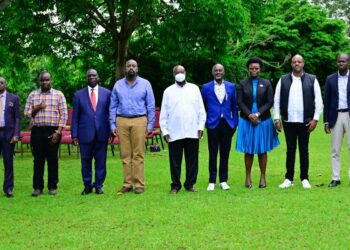President Yoweri Kaguta Museveni once again made his feelings clear regarding the exploitative land relations between Landlords and Bibanja holders in a heated commentary during this years heroes day fete hosted in Gomba district. The President is concerned that Landlords have continued to exploit vulnerable settlers through charging exorbitant dues in complete disregard of the law for which, the Head of State calls for holistic measures to call those obstinate people to order.
The remarks sharply underscores the President’s commitment to ensure land ownership equity in the country amid voices from a section of Ugandans questions the legal provisions backing up the President’s ambitious move to secure his ordinary people against the land barons of this generation.
The 1995 Land Reforms and President Museveni’s Directives to Landlords.
Perhaps the outstanding land reforms in Uganda were brought about by the 1995 Constitution and the 1998 Land Act. The 1995 Constitution is very clear: it states that land in Uganda belongs to the citizens ofvUganda. Land is vested in the citizens of Uganda in four land tenure systems which include Customary, Freehold, Mailo and Leasehold. It establishes the Uganda Land Commission whose function is to “hold and manage any land in Uganda vested in or acquired by the
Government of Uganda in accordance with the Constitution and any other functions as may be prescribed by Parliament.”
The Constitution also provides that there shall be a District Land Board for each District whose functions are:
1.To hold and allocate land in the district which is not owned by any person or authority;
2.To facilitate the registration and transfer of interestsin land; and
3.To deal with all other matters connected with land in the district in accordance with laws made by Parliament.
In the same Constitution, the District Land Board is mandated to act independently of the Uganda Land Commission in the performance of its functions. It shall not be subject to the direction or control of any person or authority but shall take into account national and district council policy on land.
However, government may, under laws made by Parliament and policies from time to time, regulate the use of land.Furthermore, Parliament shall by law provide for the establishment of land tribunals whose jurisdiction shall include the determination of disputes relating to the grant, lease, repossession, transfer or acquisition of land by individuals, by the Uganda Land Commission or by other authority with responsibility relating to land; and the determination of any disputes relating to the amount of compensation to be paid for land acquired. Articles 237 and 242 enable the state to take charge of the land and enforce its planning and development although it might give leeway for mismanagement in a corrupt environment. The 1995 Constitution tried to address the problem of land tenure in Uganda albeit many challenges still exist.
In 1998, the Land Act was enacted to regulate the land management system in Uganda. It provided for a certificate of occupancy to be issued to the occupant on application to the registered owner. The certificate is meant to enable the occupant to prove that he/she is bona fide. This therefore makes bona fide occupants statutory tenants of the registered owner and these occupants are required to pay ground rent to their landlords on mutually agreed upon rates. This is the basis of the President’s misunderstanding with the landlords. Under the provisions of this law, the original land owner remains but the law also provides for the rights of the inhabitants on the land. In 2010, a new amendment to the Act provided that tenants who have lived unchallenged on registered land for 12 years or more, or who are settled on the land by the government, cannot be evicted for any reason other than nonpayment of a nominal ground rent. But Landlords have ruthless evicted tenants, including those that have occupied land for decades. This law could have solved the land problems in Uganda, but unfortunately it did not as landlords keep under looking it.
Improved tenant security simply exacerbates dual claims to land in Buganda where title owners are unable to sell their occupied land and tenants find it difficult to develop the land they occupy because they do not own the title to it and therefore may be evicted. Furthermore, land grabbing still exists, as evident from the fact that evictions form daily news headlines today, despite the presence of land reforms.
One more interesting observation.
In the historic concept of freehold ownership of land, a person who had a freehold title had, in addition to the surface of the land, the ownership of all minerals down to the center of the earth. If gold or diamonds were found, then the person with the freehold title would enjoy the good fortune associated with the discovery. But, in Uganda, according to the 2005 Amendments to the Constitution, the ownership of all petroleum is not vested in the person with freehold title to the land; rather Article 244 of the Constitution provides that “…the entire property in, and the control of, all minerals or petroleum in, on or under, any lands or waters of Uganda are vested in the Government on behalf of the people.
What is happening today?
Today, land transfers is one of the most contested issues in Uganda. In the wake of development strategies in the country, the power to control and to use land in Uganda is seen as an impetus to investors for both agricultural and industrial development. Remember, the Land Act of 1998 made clear the tension between two parties (the landlord who is the ultimate owner of the land and the tenant who is the current user of the land) over the same land.
Despite these problems, the majority of Ugandans are ignorant about the laws and land reforms. People have continued to occupy land they do not own without the consent of the landlords and later are evicted by the owners. This has led to many conflicts over land in Uganda today.There is ignorance of the law and land tenure on both sides: the landlord is ignorant of his or her rights and likewise the tenants do not understand their rights over land.
Way forward
The only way to end land conflicts in Uganda is by educating Ugandans on their land rights as clearly as possible. Landlords must learn that their rights on land are not independent of the rights of their tenants and therefore landlords must recognize their obligation to compensate tenants when seeking to change the rights of the tenants on land owned by landlords. Tenants do have rights, but they also have responsibilities: they have the obligation of paying ground rent to their landlords if they are to be considered legal tenants on the land. A tenant who fails to do so may be evicted. One way to reduce the tension would be for tenants to purchase titles from their landlords to avoid future conflicts. Interventions by organizations and other stakeholders can help find solutions for problems arising from current state of land ownership in Uganda.
The writer is the Assistant Resident City Commissioner For Kampala Central Division
Do you have a story in your community or an opinion to share with us: Email us at editorial@watchdoguganda.com














